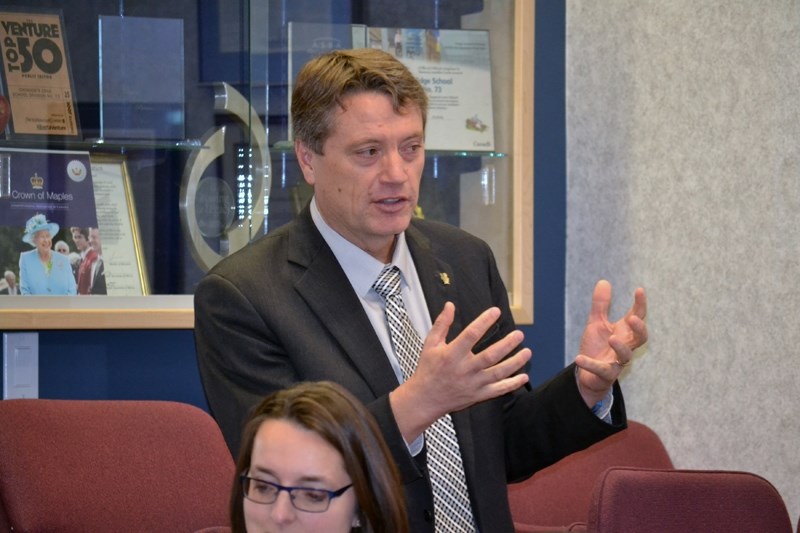Regional schools boards are generally pleased with the NDP government's April 14 provincial budget that kept its promise to provide sustainable funding for increased enrolment, but any feel-good mood is blunted by worry the impact of the pending carbon tax could cause new annual fiscal challenges of tens of thousands of dollars.
“We believe at this point in time it (carbon tax) will cost the school division approximately an extra $85,000 per year,” said Dr. Paul Mason, superintendent of schools for Red Deer Catholic Regional Schools. “Obviously we are troubled and concerned by this and curious as to whether Alberta Education will provide funding to cover off this additional expense, or not.”
He said officials from all school boards across the province were part of a teleconference call on April 15 with Education Minister David Eggen to discuss the NDP government's budget and the impact of the carbon tax on their own budgets.
“There were a number of questions asked regarding the carbon tax and some uncertainly relative to the carbon tax, for sure. I believe Alberta Education is working out the details of how this will roll out, and will be looking to get those details to school boards as soon as possible,” said Mason, adding his board is looking at a “number of options” to find the necessary funds to cover the extra carbon tax expense if the province does not provide supplementary funding.
The new carbon tax levy, which will be rolled in January 2017, will apply to purchases of fossil fuels that produce greenhouse gas emissions when burned, at a rate of $20 per tonne of emitted carbon dioxide. For gasoline, that means an extra 4.5 cents per litre at the pump. For diesel, it's 5.4 cents.
This extra cost also looms large on the minds of officials at Chinook's Edge School Division, which could find them once again scrambling to find funds to pay for the extra cost to heat the division's 42 facilities across the region, and the increased expense to run Chinook's Edge's fleet of buses and maintenance vehicles.
Susan Roy, the division's treasurer, said the school board spent $591,000 for heating its facilities in 2015 and another $715,000 on fuel for its school buses. She estimated the annual carbon tax bite on the school board budget could run in the “tens of thousands of dollars.
“All I know is that it is an unknown and it is something we are concerned about,” said Kurt Sacher, Chinook's Edge's superintendent of schools, as to how the cost of the new tax will be covered.
Despite the fiscal threat of the new carbon tax, and no answers yet from the province whether there will be financial relief, both Mason and Sacher said there were components of the April 14 provincial budget, the first major one by the new NDP government since it was first elected 11 months ago, that did bring good news.
“It would have been very tempting for government to have cut budgets for education moving forward,” said Sacher. “There was all kinds of economic indicators that would have created enough pressure for them to look at rolling back some of the funding allocations, and they have not done that. That is the main piece we like.”
However, Sacher is also concerned over existing long-term challenges the school division still faces that were also not addressed in the budget, notably inadequate funding for rural transportation, maintenance and supports for students with special needs.
“Funding for inclusion (special needs) continues to rise. We are definitely tight in maintenance (but) significant concerns in the transportation area, where we are essentially about $700,000 short every year, have not been addressed,” said Sacher. “I don't want to let government think we are satisfied by any means, because there are still some needs out there.”
Mason said he was pleased the government stuck with its promise to provide sustainable funding for increasing enrolment. He noted the 8,200-student Catholic school board is expected to grow from two to three per cent for the 2016-17 school year, which will result in up to 300 more students.
“That translates to about 10 more teachers,” said Mason, adding senior staff is already in discussions with provincial finance officials about funding, while the school board is now actively involved with “hiring rounds” for new teachers.
Sacher said his division “typically” goes up by about 100 students each year, but the number for 2016-17 is only “tentative” due to the economic uncertainty, which could cause families to move out of Chinook's Edge's jurisdictional area.
“It's really unpredictable right at the moment. Our early numbers and registration look good though,” said Sacher, adding there could be a “slight” increase to staffing to handle any increase in student enrolment. “We are up but it is not a perfect science trying to predict the exact enrolment, but overall I don't see significant changes in our staffing levels.”



